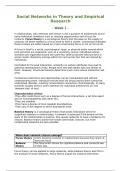Samenvatting
Summary ALLE Tentamenstof (Met alle artikelen) Social Networks in Theory and Empirical Research
- Instelling
- Universiteit Utrecht (UU)
Een samenvatting die een vrij gecompliceerd vak goed weet te dekken. Alle stof uit de artikelen staat er ook in. Zelf een 9,3 gehaald (echt waar!)
[Meer zien]




